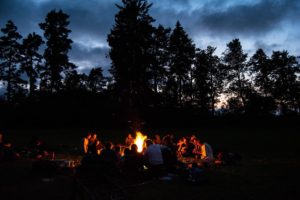
If you have followed me for any length of time, you know that I love to listen to audiobooks while running, and then sharing some of what I’ve learned with you. I’m currently listening to a book by Brené Brown, called Braving the Wilderness. It’s from 2019, and it is a bit of an odd experience listening to her talk about loneliness and community, knowing what has transpired in the world in the interim. It’s still worth reading, though, because while some of what she says has not aged very well, most of it is still as relevant now as it was then.
She recounts her own experience of growing up feeling on the outside of every community, which I can relate to very strongly. It can be quite devastating, given that we are social animals who are conditioned to want to stay around the campfire – after all, there might be sabre-toothed tigers out there. Loneliness can be fatal.
Brené describes how much she loved the work of the late Dr. Maya Angelou growing up, except for this quote from a 1973 interview:
“You are only free when you realize you belong no place—you belong every place—no place at all. The price is high. The reward is great.”
This is a terrifying quote. We spend so much time and energy trying to fit in with communities that we think will fill the void in our hearts. We create a false persona that we think is more loveable and acceptable than who we really are. Inevitably, our high expectations are disappointed and we move on, looking for the next place where we will really fit in and be at home.
This pattern will repeat until we are ready, willing and able to break the cycle, and find that freedom and self-love that will allow us to be in the wilderness without fear or shame. Ironically, that is when we will truly find community, honestly and on our own terms.
So how do we do this? How can we learn to belong to ourselves, no place and every place?
The missing ingredient is love – love of self, love of others, love of every human being on this beautiful, fragile planet. Yes, even those who fill us with fear. It’s easy to love those who are on the “right side”. How do we love those with whom we vehemently disagree? Can we? Should we? How far do we let righteous anger go, without having it turn into hate?
Brené talks about the mechanism of dehumanisation – as the Nazis did, as the Hutus did during the Rwandan genocide, as the slaveowners did in the southern US. It’s not possible to murder, torture or degrade another human if you see them as your sibling, as a person who was created in the image of the Divine, just like you.
Can we fight for justice without dehumanising and hating those on the other side? I don’t know the answer to this question. I’d love to know what you think.
